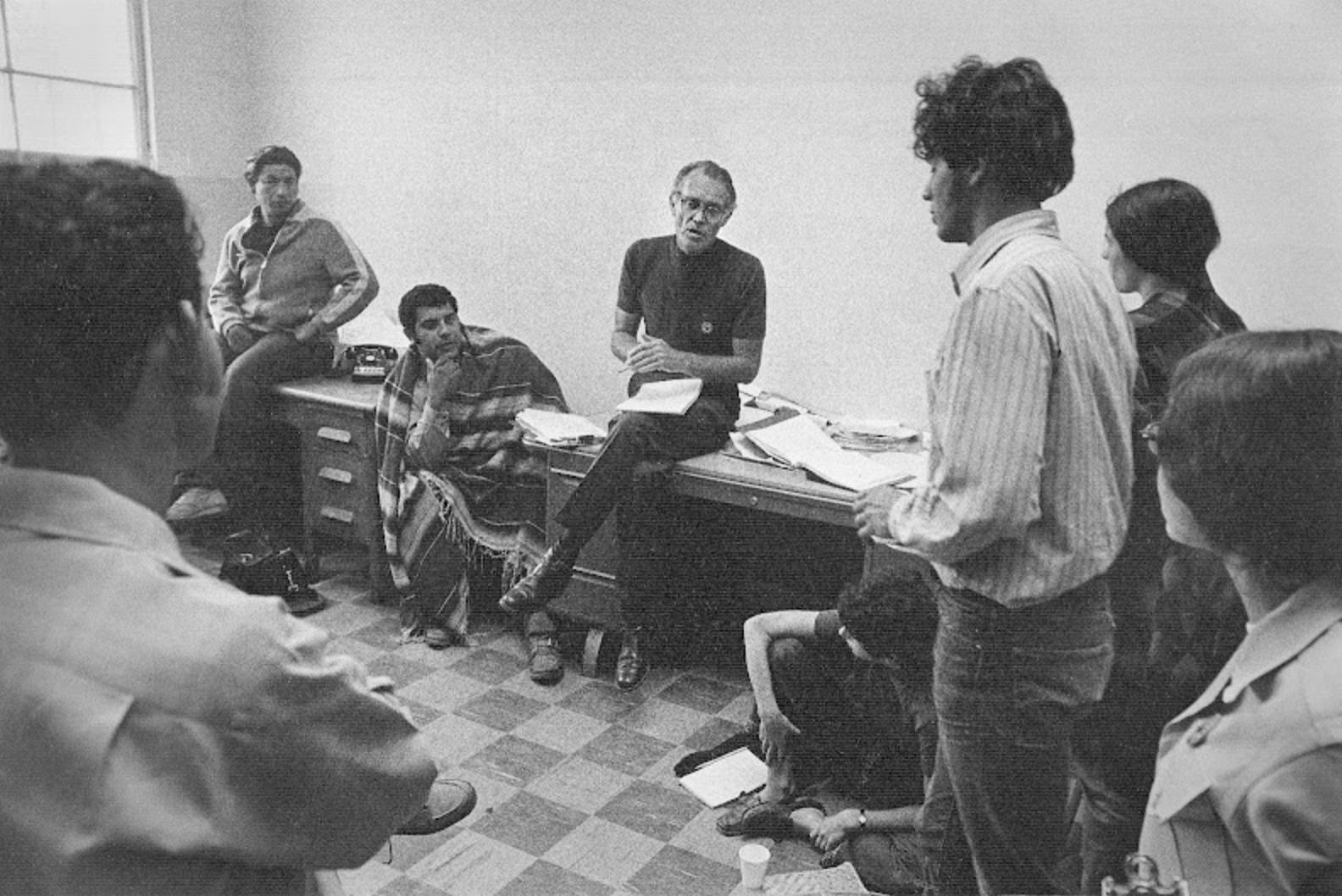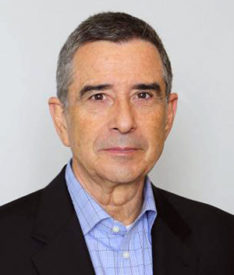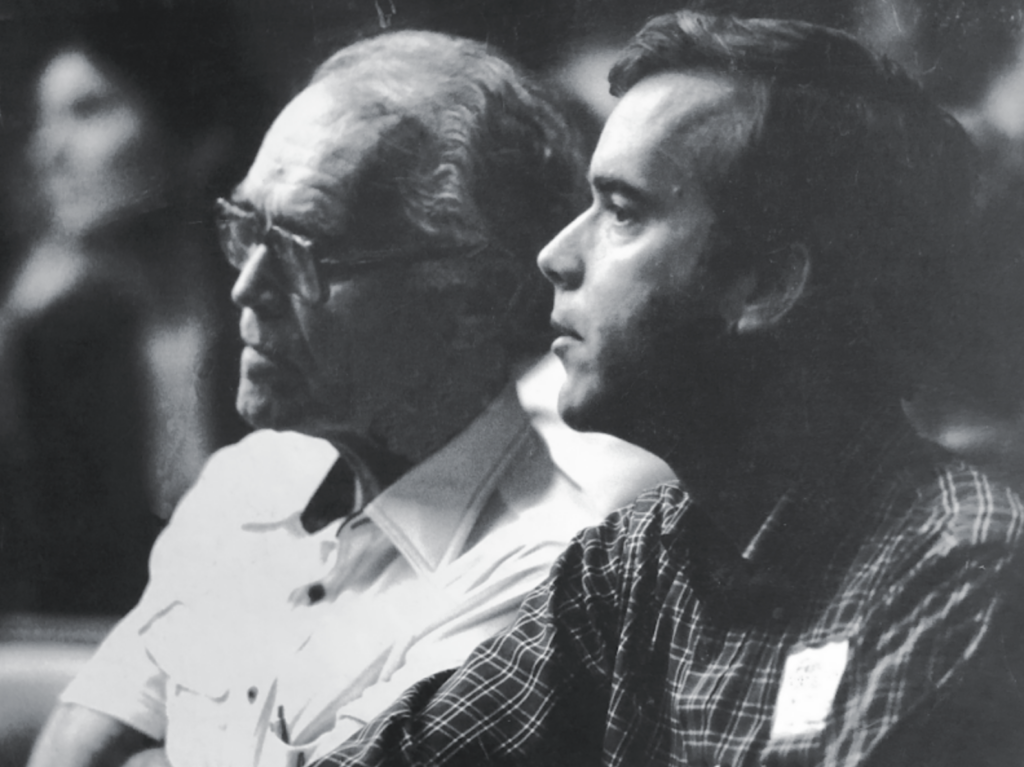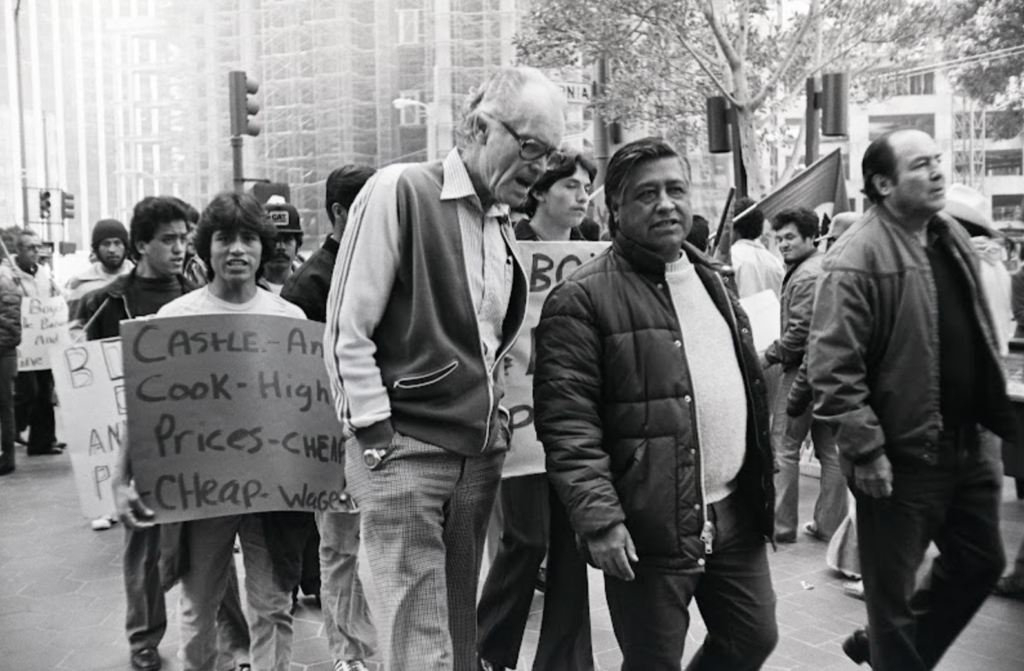Ever heard of Fred Ross Sr.? New documentary chronicles the legendary organizer’s work
'American Agitators,' an award-winning film by UC Berkeley's Raymond Telles, profiles an activist who mentored Cesar Chavez and Dolores Huerta.

Bob Fitch/Special Collections, Stanford University
March 26, 2025
If you haven’t heard of Fred Ross before, you’ve likely heard of the legendary activists he helped train, like Cesar Chavez and Dolores Huerta. Drawing on organizing tactics still used today, such as house meetings and voter registration campaigns, Ross helped secure pivotal racial justice victories, like the election of Los Angeles’s first Latino council member in 1949 and the desegregation of schools in California’s Citrus Belt in 1947. Born in 1910, he was a behind-the-scenes force for civil rights and labor organizing throughout much of the 20th century.
His life and work are the subject of a new documentary by Raymond Telles, an associate adjunct professor in the Department of Ethnic Studies at UC Berkeley. American Agitators premiered this month at the Cinequest Film and Creativity Festival in San Jose and, this Monday, won the festival’s juried award for best documentary feature.

Courtesy of the Department of Ethnic Studies
Telles, an Emmy-winning documentarian, has followed the labor movement since at least the 1980s, when he reported on it for KQED. He later made a film, The Fight in the Fields, about Chavez, who was Ross’ mentee and close friend. American Agitators’ development began decades ago, when Ross’ son, Fred Jr., asked Telles to film his father’s 1992 memorial. Work on the documentary kicked off in 2021, and the process was expedited when Ross Jr., also a formidable organizer, was diagnosed with pancreatic cancer.
American Agitators charts Ross’ unlikely path from a University of Southern California undergrad to his first job running a government relief camp for Dust Bowl refugees during the Great Depression. It follows his subsequent advocacy for incarcerated Japanese Americans during WWII, Mexican Americans in LA and farmworkers throughout California. Despite his outsider status, he gained trust as a deep listener. To testify to this impact, the film features interviews with Huerta, Chavez’ son Paul and Rep. Nancy Pelosi, whose 1987 House of Representatives campaign Fred Ross Jr. helped coordinate.
Ross taught new organizers the benefits of house meetings and wrote Axioms for Organizing, a slim handbook full of wisdom such as, “A good organizer is a social arsonist who goes around setting people on fire.”
Below, Telles spoke with UC Berkeley News about the making of American Agitators and why Fred Ross’ legacy remains relevant today.
UC Berkeley News: What do you think today’s activists can learn from Fred Ross Sr. and Fred Ross Jr.?
Raymond Telles: If you want to really make social change, you’ve got to get in there and keep on working at it, which means you protest, but then you have to do the basic foundational work of organizing. … You’ve got to bring people who are like-minded together to work, and it takes time, organization and follow-up. That’s where Fred Ross Sr. excelled, in teaching the method of the house meeting and then the follow-up to the house meeting — and that’s the way movements are built.

Anne Marie Staas
What was a challenge or a surprise you encountered in the making of the film?
We finished the film in the fall of 2024, but I didn’t know how relevant it would be, depending on which way the [presidential] election went. It is more relevant than I thought, given where we are in history. The film is about empowering people to organize in their communities or their labor unions or their schools. Hopefully it will resonate with people who want to do something. The other thing that we hope comes across strongly is that it’s really important to vote. Fred Ross Sr., Fred Ross Jr. and the people they trained are all about that. Dolores Huerta, to this day, goes out and rallies people to get out the vote.
How do you think the film, and Fred Ross Sr.’s life, help us understand allyship?
If you look at the story of Fred Ross Sr. and Jr., they were successful because they developed relationships and allies. For me, that’s especially evident in the farmworker movement. Cesar Chavez and Dolores Huerta and their movement would not have been successful if they hadn’t brought in the consumer. They were very strategic, and I think Fred Ross [Sr.] was behind it, to a certain extent, in bringing people together from many different backgrounds — from labor, from different religions, consumers — to understand that what the farmworkers were doing affected everybody. Some of the very early work around the dangers of pesticides in our fruit and vegetables was done by the United Farm Workers. That kind of awareness came about because of allyship.

Bettmann/Getty Images
We all tend to live in silos. If we want to make changes [to society], we have to bring people into the fold. I think we have to come together, particularly now. We need allies.
Many of the causes Fred Ross Sr. and Jr. championed have experienced setbacks recently. If you were shooting or editing the film now, is there anything you would change?
I don’t know if I would change anything, but perhaps I would’ve brought in more young activists. We needed to make sure that we were following organizations that would still be intact when this film was [released]. For example, there was the Sunrise Movement. We were ready to shoot with them, and then the organization fell apart. They did some very intense, wonderful work for about four or five years, and I think the folks just burned out.
A really important thing to consider is burnout. How do you do this kind of work for years and years and maintain your sanity, your energy, that kind of thing?
The third act of the film — which is contemporary — was the one where we really struggled with who to include and how to incorporate them in a way where the film remains evergreen. That was a concern that I had. I’m not worried about it anymore, given the state of affairs.
This interview was condensed and edited for clarity.